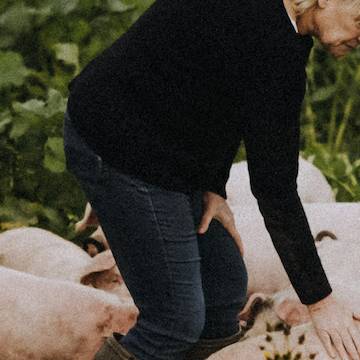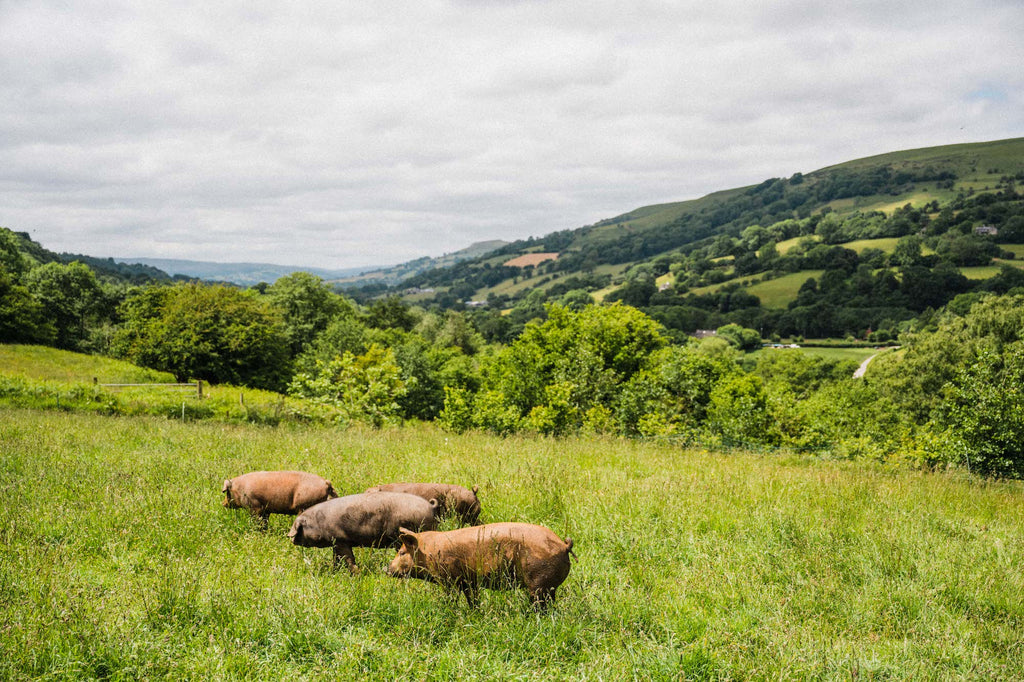
Careful Breeding
Our pigs spend their entire lives outside in varying weather conditions, this means it is vital that we rear resilient pigs that can thrive during hot summers, cold winters and wet much of the time in between!

Native breeds have evolved for centuries as part of their ‘terroir’, they are hardy and well equipped to deal with the climate, soil, disease and the food source available where they are grown. Native breeds are an integral part of our rural landscape, which means they can be reared in harmony with nature, using low input systems that rely on what is available in that specific geographical area.

Family Farms
At our HQ we rear a small number of native breed pigs during Spring to Autumn, free ranging in our ancient cider orchards. Alongside this we work directly with three incredible small scale family run farms who work to our set of standards producing some of the best pigs in the country.
Based only four miles up the road from HQ is a brilliant mixed farm and home to our herd of Wessex Saddleback cross Welsh pigs.
On this farm all of our breeding sows are Wessex Saddleback, the native West Country breed with the distinctive white saddle across her shoulders. We cross these traditional pigs with another native breed, a Welsh boar, another traditional slow-growing pig. The result is an old-fashioned slow growing pig, decorated with pink and blue patches, and, like their parents, their ears flop over their eyes.
This diverse farm grows their own barley, fodder beat and straw. Pumpkins, kale, turnips and pasture are also grown as part of this mixed system and provide a rich and nourishing diet for the pigs.
The second of our brilliant pig farmers is based up on wild Exmoor with the most unspoilt scenery for miles - lucky pigs!
Here we rear Tamworth cross Hampshire pigs. Tamworth's are one of the oldest pig breeds in the country, they are hardy and adjust well to climate fluctuations due to their naturally thick skin, bristly hair and robust feet, this makes them an excellent choice of pig for this often wild landscape. We cross the Tamworth sow with a handsome Hampshire boar. Hampshires are genetically and physically very similar to the better known Saddleback, however instead of droopy ears over their eyes they have 'prick' ears pointing up to the sky.
The pigs enjoy large swathes of land broken down into smaller pens, giving the deep rooted pasture the ability to regenerate as the pigs move around the farm. With heavy tree cover, shade and woodland is aplenty, which also provides protection from the blustery winds that whip across the hills.
Nearby this special farm is a small food production facility that bags up fruit and nuts that you find on a supermarket shelf. With supermarkets being so picky and rejecting much good food due to it not meeting their 'spec' means often a lot of this prime mast and luscious fruit is wasted by the factory. No longer! Our herd of native breed pigs are now making use of all the waste fruit and nuts. Often you'll find our herd munching on Macadamia, picking through Pistachios and chewing on Cashews!
Lastly, we head across the boarder at Hereford and on into Wales to find the home of our Welsh Black pigs. Here the pigs are living surrounded by dense woodland on steep hills with views that stretch across to Table Mountain. The pigs are reared in amongst the woodland and on pasture in this unspoilt corner of the Brecon Beacons.
The breed of pig, the 'Welsh Black' is entirely this farming teams own creation. It's a mixture of predominantly Large Black genetics crossed with Duroc and sometimes a tri-cross including Mangaliza or Tamworth. The Large Black is Britain’s rarest pig, it is estimated that there are only 200 breeding females left in the country!
On this farm pasture makes up a significant part of the diet of the properly free ranging pigs. Along with a carefully formulated pig nut, the pigs have access to as much forage as they can eat. Special pig grass, a really deep rooting, hard wearing and palatable grass is sown across the paddocks on the farm.
Farrowing
All our sows live outside and farrow outside with straw bedded arks. Pigs are intelligent animals and it is incredibly important for them to be able to exhibit their strong natural instincts. One of these is to build a nest before farrowing, which might take a couple of days. They do this using straw and clumps of earth and grass. The nest guides the piglets as they are born onto the teats – totally natural and so different from the way sows are kept in industrial pig systems.

We leave the piglets on their mother for 6-8 weeks, to get the full benefit of their mother's milk, and as well as rooting outside from only a few days old it ensures they build a strong natural immunity, which means that we only use medication when it is absolutely necessary during their adult life. Giving our piglets the best start in life is so important for a healthy, hardy herd who can thrive in our fully outdoor, properly free range system.

Properly Free Range
All our pigs live outside, in family groups, roaming freely and display all of their natural instincts, digging for roots and wallowing in mud - Mother Nature's brilliant sunblock.
Pigs are highly social creatures with individual personalities, and spend much of their time naturally interacting with one another.
Our pigs live outside for their entire lives in family groups, from birth right until they have reached natural maturity.
We castrate our male piglets at 7 days old. This is a very quick simple procedure and contrary to media sensationalism is not painful - the best way to describe it is like getting your ears pierced or perhaps having a quick injection at the Doctors surgery. It is our strong belief is that it is the right thing to do for 3 key reasons. Firstly, it helps us provide optimal welfare for the pigs by giving them a longer fuller life. The male piglets are then able to grow slowly in a stress-free environment to reach natural maturity, alongside the gilts (female pigs) who are often their sisters. Secondly, the castrated males are more 'relaxed' and not, at any stage, exhibiting behaviour driven by high levels of testosterone. Finally, exceptional eating quality has always been the an important objective of everything we do in our day-to-day farming. We know that entire males definitely compromise our ability to achieve this with what's known as 'boar taint'. (Boar taint is a male pheromone that is produced in the testes as male pigs reach puberty and gives the meat a urine or sweat flavour. It can effect about 1 in 20 pigs. The only way to reduce the impact of boar taint, other than quick castration at a very young age is an unnecessary heavy dose of vaccination that targets the pigs immune system).
Unlike industrial systems, we do not clip the piglets' teeth or dock their tails – it is unnecessary when pigs are reared outside for their entire lives, with plenty of space to roam, living in totally natural conditions.
You can find out more information about how our pigs are so different to industrial pigs by reading our blog.
Natural Diet
Our pigs are raised on pasture and forage crops such as kale, turnips and fodder beet.
Pigs are monogastric animals, which means their digestive system is adapted to extract nutritional value from a wide range of sources. In traditional farming systems pigs have been very efficient processors of waste and by-products. Our native breed pigs are not genetically engineered to respond to highly processed industrial diets. Instead, they thrive on a wide range of simple ingredients ranging from cereal grains to forage to acorns or apples, and very importantly soil biota to nourish their own gut biomes.
You can find out more about our mission to get pigs to eat wasted food.

Regenerating the Soil
Sustainable food systems are about much more than simply avoiding chemicals and antibiotics, they are about building organic matter in the soil through crop rotation and mixed farming practices. High levels of organic matter are the basis for soil fertility, releasing nutrients for healthy plant growth and ultimately food. In other words, the amount of organic matter present in the soil is essential, both for combating climate change and ultimately improving our health.

Managed effectively pigs provide one of the most sustainable ways of improving soil health, ploughing and fertilising the ground in the most natural way, minimising the use of machinery and inorganic fertilizers. The key is to rotate the pigs around the farm in order to reduce burden on a particular part of the ground.

Exceptional Quality
Our talented, likeminded farmers work to our standards to ensure every animal reared is of exceptional quality and has been produced in a way you can have complete confidence in. We work closely with our farmers to ensure we are treading as lightly as possible on the land and producing delicious nutritious food for your table.

Humane Slaughter
Our pigs are taken a short distance to their local, low throughput abattoir. This is very important to us - it means that the animals are not stressed with unnecessarily long journeys or the horrors of large abattoirs. The pigs are each stunned by hand, one by one, with exceptional care by highly skilled craftsmen. Providing our pigs with care and respect at this stage is integral to our beliefs, it is no good putting all of the love and care into producing a pig if their end is not handled with the utmost respect. For anyone wanting to know more information about slaughter, please feel free to contact us and ask, it is vital that if we are to eat meat, we do so feeling comfortable with every step in the process. Slaughter should be openly discussed and should not be a taboo, it is a reality of putting food on the table.
The carcasses are delivered from the abattoir to butchery in Exeter in perfect condition where they are hung on the bone, in the traditional way for 3 weeks. It is most unusual to hang pork – however we believe it helps to develop the award-winning sweet, melting flavour that has won us so many awards over the years.
If we are making bacon or gammon, our carcasses are not initially hung, instead we air dry the gammon and bacon once cured.
Shop Native Breed Pork
Our native breed pork has a distinctive, rich flavour and a fantastic texture, which are further enhanced and intensified by the maturing process. Our native breed pork has collected many accolades over the years, including Top 50 Best Products in the Great Taste Awards.
Shop our range of native breed pork here.
As ever, please do feel free to ask us any questions about the way we rear our Properly Free Range pigs.